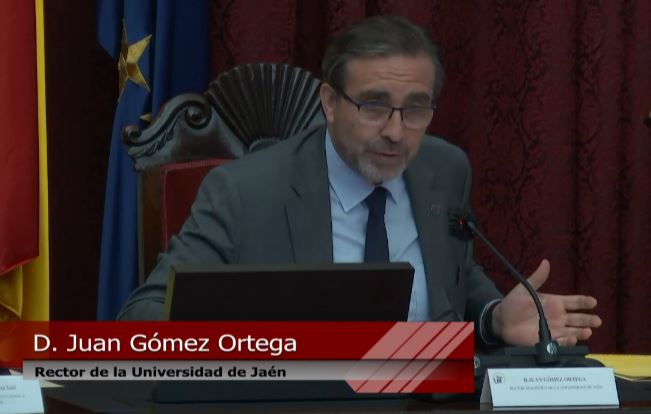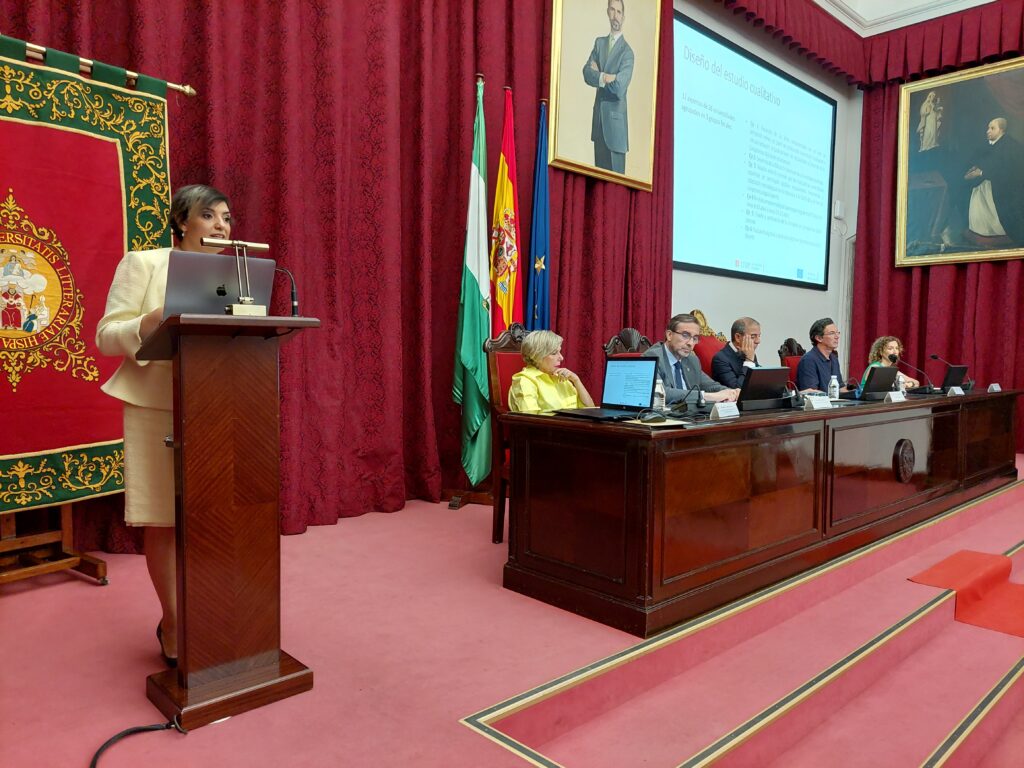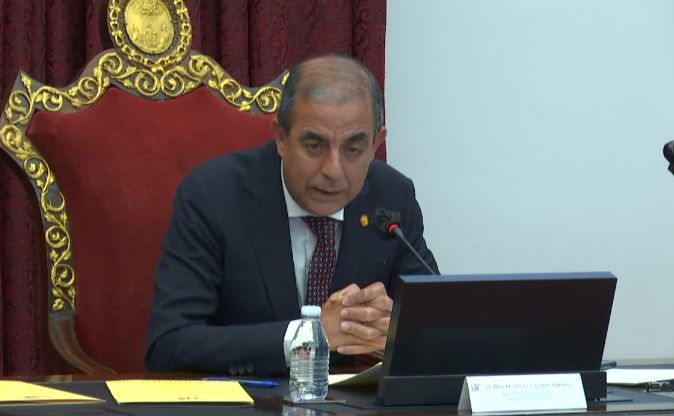Seville, July 13, 2022. The President of Crue’s Sectorial Commission for Digitalisation and Rector of the Universidad de Jaén, Juan Gómez, presented the conclusions of the report ‘The digital competence of academics in Spain’ in the Auditorium of the Universidad de Sevilla, accompanied by the Rector of this university, Miguel Ángel Castro. The report was carried out by Crue’s Sectorial Commissions for Digitalisation and Learning and Teaching, in collaboration with the Joint Research Center of the European Commission (JRC), whose Director in Seville, Mikel Landabaso, also participated in this event. This pioneering document in Spain and the European Union, in which more than 5,000 professors from 51 Spanish universities have participated, will be key to define the policies to be developed by these institutions to improve the digital skills of teaching staff.
Pedro M. Ruiz, Executive Secretary of Crue’s Sectorial Commission for Digitalisation and Vicerrector for Strategy and Digital University of the University of Murcia, and Andreia Inamorato dos Santos, Senior Researcher at JRC, presented the main results. They have prepared this documento together with six experts from Spanish universities: Marçal Mora-Castallops (Universidad de Alcalá), Cristina Villalonga-Gómez (Universidad Nebrija), Juan Ramón Lacalle Remigio (Universidad de Sevilla), Juan Camarillo Casado (Universidad de Sevilla), José Manuel Sota Eguzábal (Universidad de La Rioja) and Juan Ramón Velasco (Universidad de Alcalá).
The report focuses on the importance of adequate digital skills of university teaching staff to train their students with the digital skills the need to function effectively in the new cultural and labour scenarios. In this sense, the Executive Secretary of Crue’s Sectorial Commission for Digitalisation, Pedro M. Ruiz, explained that the survey shows that Spanish teachers consider they have a level of competence of «leader» (above that of «expert») in the categories of «Professional Use» and «Content Creation». On the contrary, he pointed out that teachers believe that they must continue improving in the category of «Open Education», which includes the use of open licenses in educational resources, open educational practices for a more inclusive teaching, open research publications and the availability of open research data.
He also highlighted that the study shows that age –the dividing line generally appears at 50 years of age– is the variable that shows the greatest differences in the levels of self-perception, while no significant difference is observed between professional categories, dedication, or gender. By branches of knowledge, the highest level of self-perception is that of teaching staff in Social Sciences and Arts and Humanities, followed by that in Engineering and Architecture and the teaching staff in Sciences and Health Sciences.

In his speech, the President of Crue’s Sectorial Commission for Digitalisation and Rector of the Universidad de Jaén, Juan Gómez, recognized the importance of this study for the Spanish University System because «it offers a snapshot of the situation that teachers perceive in terms of their level of digital skills», which, in his opinion, can serve universities to advance in teaching innovation, incorporate more technological resources, raise awareness within the university community with «not so young» teachers, and advance in the certification of skills as an «additional merit’ within the evaluation of teaching staff. ‘This is an ambitious project, a point of reference to know what we have to do in the future», he stressed.
Advance in the hybrid models of Education
Another important aspect highlighted in the report is that the pandemic has accelerated the digital transformation projects that many universities had started, such as the digitisation of classrooms or the promotion of digital scenarios. According to the authors, it is now necessary to continue advancing in the integration of new learning and teaching models that have been put into practice (hybrid model) in order to take advantage of all its advantages.
Andreia Inamorato dos Santos, senior researcher at JRC, explained that, in addition to the survey itself, this study has organized focus group debates to delve into the results and identify needs and next steps to improve digital competences of teaching staff. These discussions brought together 32 experts from 26 Spanish universities who identified challenges to overcome, such as excessive rigidity in academic regulations; the need for students to have a better digital competence when they enter the University and for this to continue to be developed on campus; the importance of promoting personalised training to continue improving digital competences of teaching staff and of certifying it using homogeneous and uniform criteria at a national and, also, European level.

Mikel Landabaso, Director of JRC in Seville, valued the good collaboration with Crue in this project and pointed out that the effort made must have an impact at a European level: «We want this pioneering study to be a benchmark in Europe and to be replicated in other countries», he asserted. As he recalled, reports indicate that 22% of current jobs are going to be automated in 2030 and that this requires a transformation at the level of digital skills to «provide a future to the new generations».
Overall, the study calls for sufficient funding from the different stakeholders of higher education to promote policies that promote and recognise digital teaching competences in a homogeneous and coherent manner, as well as initiatives that go beyond individual projects.
For universities, the report argues that, to involve teachers in their training, specific calls for innovation projects are needed. These projects should make use of these skills and would require more technological resources and techno-pedagogical support, as well as time in the official workload of teaching staff to allow them to develop these skills. It also proposes that universities promote the recognition of teachers’ digital skills in their professional careers.
More funding for training academic staff
Autonomous Communities are asked to guarantee the necessary funds so that teaching staff can be trained in digital skills. To do this, they are reminded that, in addition to using their own funds, they should follow up on the different possibilities of co-financing offered by the European Commission, such as the additional specific lines for the digital transformation of universities.
During the event, participants insisted the Spanish Ministry of Universities that the evaluation agencies should take accredited digital skills into account as an additional merit to access the different teaching staff positions.
Lastly, participants suggested that the European Commission could explore the possibility that the certification of digital competences in teaching staff be carried out at a European level, in a similar way to the framework of digital competences for citizens DigComp, and recalled that the European Strategy for Universities and the Digital Education Plan 2021-2027 point to digital transformation as one of the challenges that will most strongly mark the well-being of future European generations.
During the closing session, Rector of the University of Seville, Miguel Ángel Castro, acknowledge the efforts made by all the people who have made this pioneering report possible and underlined that «addressing uncertainties of all kinds, and asking the appropriate questions, means advancing in the XXI century». The also President of Crue’s Sectorial Commission for Internationalisation and Cooperation insisted that this study not remain in the «domestic sphere of the Spanish University System», and that it must reach the «maximum number of recipients» at a European level.


